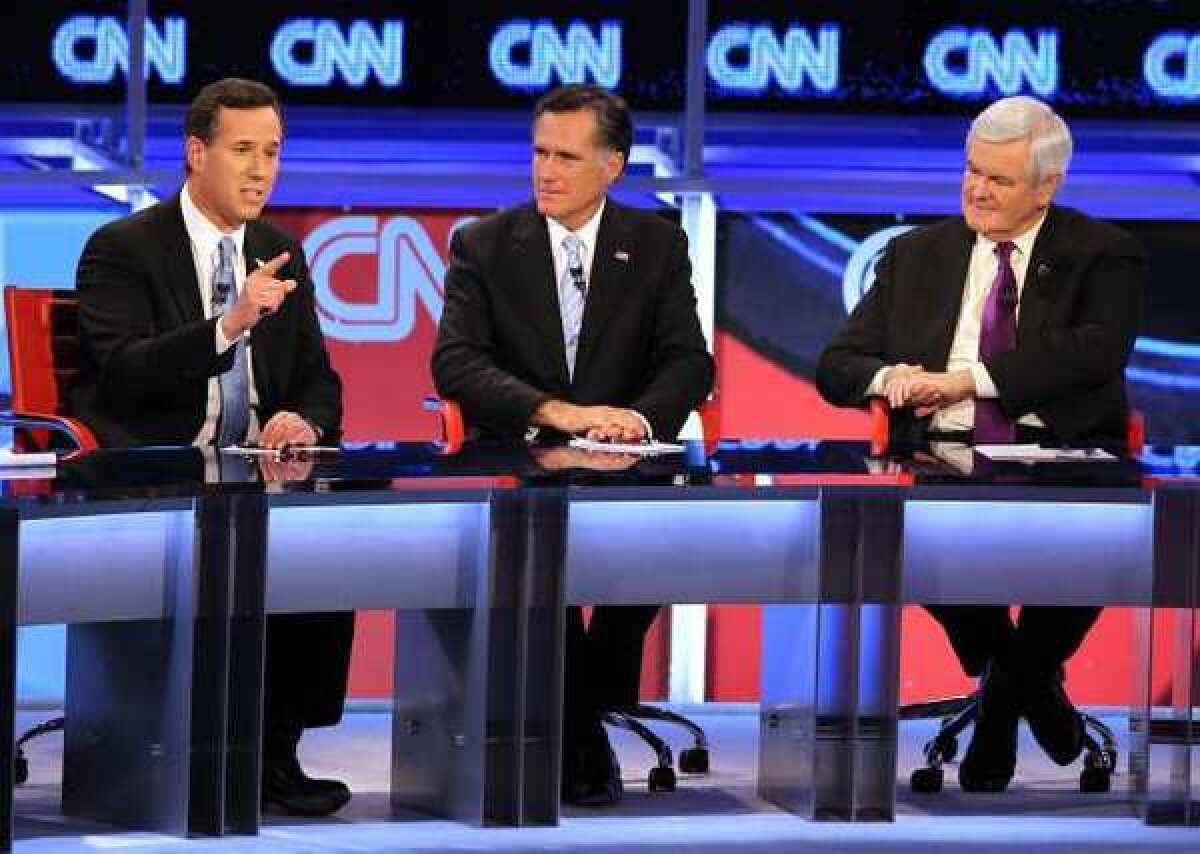McManus: Campaign 2012’s lessons so far

- Share via
It sometimes feels as if the struggle for the Republican presidential nomination has been going on forever, but if you measure the campaign by the number of delegates chosen so far, we’re only about 10% done.
Much has been made about how the outcome is still far from certain despite what seems like a blizzard of primaries and caucuses, but that’s not unusual. Four years ago, Barack Obama and Hillary Rodham Clinton waged a struggle for the Democratic presidential nomination that didn’t end until June 3.
Still, it’s worth pausing at this point in the race to consider a few of the lessons we’ve learned so far.
Don’t listen to the pundits. At the beginning of this year’s campaign, many political reporters and analysts (including me) listed the leading contenders for the nomination as Mitt Romney, Tim Pawlenty, Michele Bachmann and Rick Perry. Only one of those four is still in the race. Hardly anyone predicted that Rick Santorum and Newt Gingrich would turn out to be serious contenders.
This year, the GOP establishment isn’t calling the shots. In earlier elections, Republicans tended to settle early on an established candidate who had endorsements from party elders and who was considered “next in line.” That system gave us Bob Dole in 1996, George W. Bush in 2000 and John McCain in 2008. This year’s establishment candidate is Romney, but he’s having a notably difficult time taming the insurgent mood of most of his party’s voters.
Historical “rules” are often bogus. Early this year, pundits often pointed out that no modern candidate had ever won the Republican nomination without first winning the South Carolina primary. I’m betting that Gingrich, who won South Carolina by a big margin, will not be the party’s nominee, although, in view of Lesson 1 above, you should believe that forecast at your own risk.
It’s worth keeping Lesson 3 in mind as we look forward to the general election too. Another “rule” is that an incumbent president has never won reelection when the unemployment rate is higher than 7.2%. (That was the rate when Ronald Reagan won his second term in 1984.)
In November, the unemployment rate is almost certain to be close to 8%, which would appear to doom President Obama. But already prognosticators are looking for an out in case the “rule” doesn’t hold this year. More important, they’re saying, may be whether voters feel the economy is improving.
By that measure, Obama’s chances look much better. A CBS/New York Times poll released last week found that more voters think the economy is improving than think it is worsening, a sharp reversal from the pessimism that dominated the public mood last year.
The thing about election truisms is that they hold only until they don’t. After this year, South Carolina probably won’t figure strongly into the common wisdom about primaries. But you can be certain that some other piece of political wisdom will replace it, and that we’ll be looking to Florida or Michigan or Ohio as the next oracle state.
More isn’t necessarily better, at least when it comes to debates. Wednesday’s GOP debate in Arizona was the 20th of the campaign. Never before have we seen so many debates in such a concentrated period — six in January alone.
Why so many debates? The magic of free enterprise. The cable channels — CNN, Fox News, MSNBC — have discovered that debates attract big audiences and don’t cost much to stage, so they have competed all through the primary season to hold as many as they could.
But that has put the candidates and their strategists on the spot. They can’t afford to opt out of events that so many voters are watching, but campaign aides are complaining that the candidates have spent too much time focusing on debate preparation and performance. And each debate carries the possibility of disaster. For every candidate like Gingrich, whose once-moribund campaign was revived by his strong debate performances, there is a Perry, whose inability to think on his feet helped sink his run.
Veteran campaign managers from both political parties have been quietly meeting over the last few weeks to try to organize a more orderly debate calendar, and less of a free-for-all, for the 2016 campaign.
Money is the mother’s milk of politics, an old lesson in a new form. The most important man in the Republican race today may be Sheldon Adelson, the Las Vegas casino tycoon who has bankrolled Gingrich’s ostensibly independent “super PAC.” In a campaign run under the old rules, with limits on donations, Gingrich would have to either drop out of the race at this point or go deeply into debt to stay competitive.
This year, if Adelson and his family continue their support — which at last accounting stood at $11 million, with hints that more could soon follow — the former speaker of the House can stay in the race no matter what the voters say. But more on that in a later column.
More to Read
Get the L.A. Times Politics newsletter
Deeply reported insights into legislation, politics and policy from Sacramento, Washington and beyond. In your inbox three times per week.
You may occasionally receive promotional content from the Los Angeles Times.











